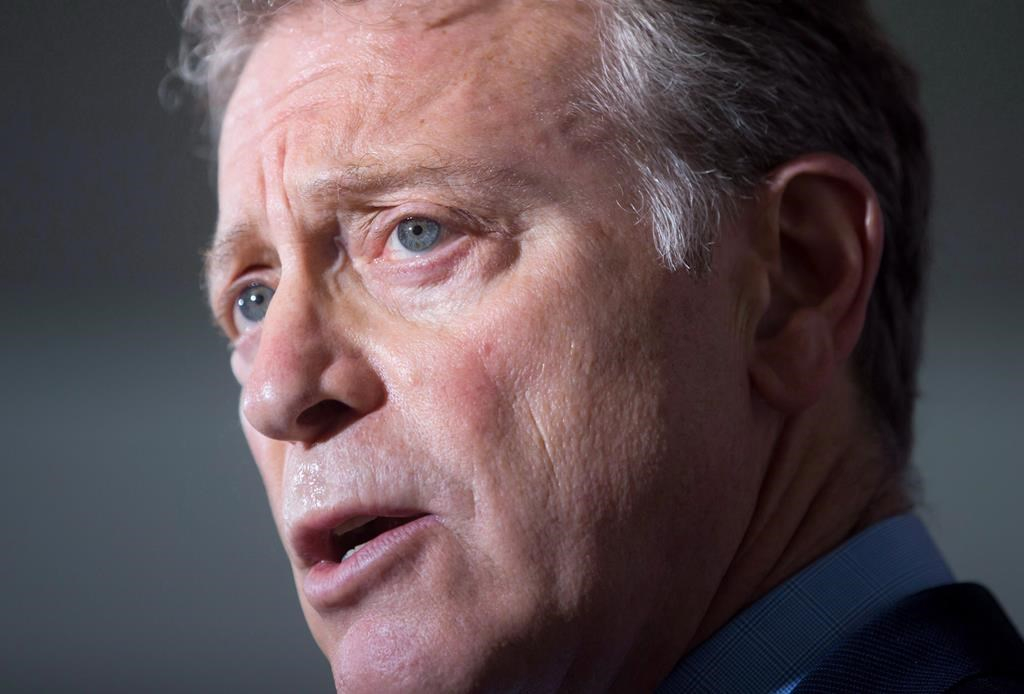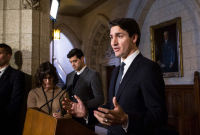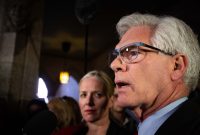Support strong Canadian climate journalism for 2025
Disputes over the Kinder Morgan Trans Mountain pipeline should be settled in court, B.C.’s environment minister said Tuesday.
“Where there is a dispute, we’re going to court. That’s where disputes should be settled, not by threats, coercion and intimidation,” George Heyman said in an interview. “I’m frankly very disappointed at the noise that we’ve been hearing around retaliatory action. If they have a problem with what we’re doing, do what we do. Go to court to settle the dispute.”
Tension has been rising since Kinder Morgan announced Sunday that it would stop all non-essential spending on the $7.4-billion Trans Mountain pipeline expansion, saying opposition by the province of B.C. is putting shareholder resources at risk.
Prime Minister Justin Trudeau has said the project is in the national interest and will be built, while Alberta Premier Rachel Notley has said her province could cut off B.C. from Alberta oil supplies. Federal cabinet ministers met Tuesday to discuss options and there has been speculation that Alberta or the federal government could invest in, buy or insure the pipeline to prevent losses to Kinder Morgan shareholders.
If Alberta or the federal government invest in or buy the Kinder Morgan pipeline, B.C.’s approach won’t change, Heyman said.
“Our approach is based on protecting B.C.’s economic and environmental interests through all the appropriate regulatory authorities,” Heyman said. “We’ve been clear we don’t think the project is in B.C.’s best interest – that it comes at great risk with virtually no benefit.”
British Columbia gets most of its gasoline from Alberta via the Trans Mountain pipeline and 10 per cent of it from Washington State, according to the National Energy Board. Heyman does not think Alberta is legally able to cut off B.C.’s gasoline supply.
“All the advice we have is that under Canada’s trade agreement, … there is absolutely no way Alberta can lawfully cut off oil to B.C. without cutting off to the entire country of Canada,” Heyman said. “They have to treat all provinces equally and we will be very aggressive.”
If Alberta or the federal government decide to take an ownership stake in the pipeline, that’s their decision, Heyman said.
“British Columbians expect us to stand up for our environment and our jurisdiction to do that and that’s what we’re doing,” he said.
Kinder Morgan has said it will wait until May 31 to see if a solution can be found.

Supporters say the pipeline expansion, which would triple the capacity of the existing pipeline, would fuel growth in the oil industry, create thousands of jobs and millions in new tax revenue, while opponents say it would put the coastline at risk and push Canada's climate change goals out of reach. Dozens of people have been arrested in the past month for breaching a court injunction requiring a five-metre no-go zone around the company's operations.
Heyman urges Alberta and the federal government to work within the country's legal system.
“In February, B.C. threatened regulations to restrict an increase in diluted bitumen from any new pipelines in its borders in response to Kinder Morgan's plan," Heyman said. "Alberta responded with a ban on B.C. wine. B.C. then backed off and said it would send a reference question to the courts to see if it has the right to impose environmental restrictions on oil.”
The B.C. government has retained lawyer Joseph Arvey to prepare and present this new case, which looks at the right of the province to protect its land, coast and waters. The case will be ready for filing in court this spring and an announcement is coming “very soon,” Heyman said.
There are at least four other cases opposing the pipeline that are before the courts, including three in which the cases have already been heard and are waiting for judgment and one that is being appealed by the City of Burnaby.
The first case, concerning the National Energy Board’s approval of the project, was heard at the Federal Courts in Vancouver in October 2017 and was brought by First Nations, the Cities of Vancouver and Burnaby and two environmental organizations. The province was granted intervenor status.
Another case, which was heard in Vancouver in November, was raised by the Squamish Nation against the province’s approval of an Environmental Assessment Certificate for the project. The City of Vancouver also sought to set aside the Environmental Assessment Certificate. The province defended its approval of the Environmental Assessment Certificate in the first case, but took no position in the City of Vancouver case.
The City of Burnaby and B.C. filed an appeal of a National Energy Board decision to allow Trans Mountain to bypass Burnaby’s zoning and tree bylaws. The Federal Court of Appeal did not accept this appeal, however Burnaby has said it will appeal the decision to the Supreme Court of Canada.
Although the province is fighting the pipeline in court, it is also taking measures in case the pipeline is built.
“We are working ahead to ensure that if this pipeline proceeds and nothing changes in terms of the approval, that we can take the measures here in British Columbia to make it as safe as possible from the perspective of prevention of spills and that in the event one happens, which of course, we don’t want to see, that we have appropriate response and recovery times,” Heyman said.
Washington State also has concerns about the pipeline, Heyman said.
“Governor (Jay) Inslee of Washington State has been very clear in that he thinks the increase in tanker traffic is a threat to all jurisdictions that border the Salish Sea and that includes Washington State,” Heyman said. “He's spoken out about that, but this is a Canadian issue. If it’s an issue that Washington needs to deal with, they need to deal internationally with the government of Canada.”
In the meantime, the province is also doing what it can to prepare for the pipeline, if it is built.
“We have said we want to review the existing science and any new science to ensure what we can do to extend the greatest protection to B.C.’s coastline and inland waters,” Heyman said.
The province is setting up a scientific advisory panel to make recommendations about safety measures that should be in place to protect B.C.’s coastline, groundwater, inland rivers and lakes, Heyman said.
“We are working on terms of reference as well as the participants,” Heyman said. “We’ve been having ongoing discussions with the federal government, because they’re doing research at the same time. Despite all of the public statements, we take our relationship with the federal government seriously and whenever there is a change to work together, we welcome that.”
Tracy Sherlock writes about the B.C. government for National Observer. Send her news tips and story ideas to [email protected].







Comments
Courts don't always make the legally correct decisions, especially if controlled by the government.
Anyone care to bet on the outcome of this one?
"Supporters say the pipeline expansion...would...create thousands of jobs and millions in new tax revenue...." These assertions by supporters and government decision-makers have been disputed in detail by knowledgeable commentators. The "15,000 permanent jobs" would really, even according to KM's infomation to the National Energy Board be many fewer temporary jobs (2 years) and only 50-100 full-time permanent jobs. Economist Robyn Allan, former head of both ICBC and of BC Credit Unions, says the tax revenue would be a fraction of what is promised. These bogus claims should at least be labeled "disputed" when they are reported.
Exactly. And how come the National Observer never mentions the 10 000's of jobs to be lost in the tourism & wild fisheries if there was a sizable spill? Look what the little spill did to Bella Bella.
There is a simple solution. Send the bitumen, undiluted, by rail. There are two ways that this can be done. Heated and insulated tank cars are one method. The other is to ship Canapux or bitumen pellets using coal cars; these are not hazardous and can easily be cleaned up after a spill; as well they can be made in such a way that they float. A pilot plant to make the Canapux is under construction.
An obstacle to this is the agreements that Kinder Morgan has with the oil companies that require them to pay even if they do not use the pipeline. There should be creative ways to cancel these agreements.
I agree that we should enable Alberta to get its products to markets - - but not at any price, and sending diluted bitumen through a pipeline to tankers in Burrard Inlet is too high a price.
We urgently need our elected representatives as well as our judiciary to demonstrate that they have an appropriately comprehensive knowledge of climate science, and that they are acting in the true best interests of all of us, not just those of us who belong to powerful and wealthy lobby groups.
All those running for election should be required to demonstrate an adequate working knowledge of the 5th IPCC report, Summary for Policymakers. It is less than 30 pages long. Surely they are responsible enough that they would ensure they were acquainted with its contents, if not the full report, before asking the voting public to put our fates in their hands? I would wager a bet that none of them would even know how to find it on the internet, where it is available for free to the global population.
We have elected a party and Prime Minister who are just as beholden to the fossil fuel industry as the Harper Conservatives were. Despite having young children themselves, our PM and our Environment Minister are prioritizing the profits of a Texas pipeline firm and several mostly foreign fossil fuel companies, over the viability of our planet for our children and grandchildren. They are selling out the next generation, and accepting mass extinctions, destabilized climate, rising sea levels, worsening weather catastrophes, risks to all Canadians of loss of home and livelihood, to appease one industry, in one province. They claim we must do so so that the provinces will sign on to a very paltry carbon tax, which the Liberals have stalled on introducing, and which the next likely Premiers of Alberta and of Ontario and the current Premier of Saskatchewan have stated they will not respect.
Sure, we need jobs, and we need energy. We just don't any longer need, and can't afford, for those jobs to come from the type of energy industry that has pushed our planet to the brink. We need renewable energy investments, as well as investments in mass and active transit, energy efficiency, and battery storage. Lots of jobs to be had in these areas, if we weren't bent on ignoring the opportunities.
And Justin Trudeau lied about bringing in electoral reform, which would have allowed those citizens responsibly concerned about the world we will be handing off to our children, to vote for representatives who would care enough to make themselves familiar with climate science, and to truly act in the national interest.
Liberals are making a ridiculous assumption that if they hear criticisms from both sides, that they are somewhere in a reasonable middle. They ignore that the fossil fuel industry has worked to obfuscate the science of climate change for decades. They ignore the rapidly escalating costs of dealing with raging wildfires and massive floods, rising sea levels, coastal erosion, and melting permafrost. They ignore the fact that the vested interest on one side is concerned for shareholders' short term profits, while the vested interest on the other side is concerned for the survivability of the planet for their children and grandchildren, and for all the species unlucky enough to share the planet with a wilfully ignorant one like ours. They again ignore the rights of First Nations, satisfying themselves with empty apologies for past injustices, while doing nothing to protect their futures.
Trudeau is a sellout. He wouldn't recognize "the national interest" if he fell over it. And this comes from someone who voted for his party. Won't make that mistake again.